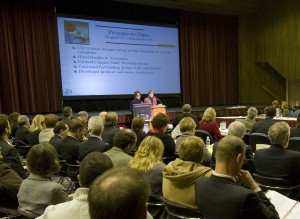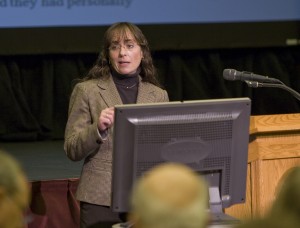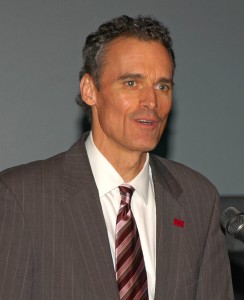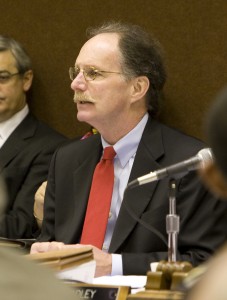Host campus UW-La Crosse highlights stories of student success
LA CROSSE, Wis. – Campus climate assessments at five University of Wisconsin institutions indicate that most students, faculty, and staff are satisfied with the overall climate at their institutions, but any deficiencies must be addressed if the UW is to remain competitive, UW System President Kevin P. Reilly told the Board of Regents Thursday.
“If the issues identified by this survey impact our current educational environment and the quality of the learning experience, we must act expeditiously to address them,” Reilly said.
The Regents opened their meeting in La Crosse with a report on the UW System’s Campus Climate Assessment project and the first round of results, which were released this fall. The study, initiated two years ago in conjunction with the nationally recognized firm of Rankin & Associates, is designed to assess institutional climate for diversity and inclusion with regards to multiple identity groups, including race/ethnicity, gender, sexual orientation, veteran status, age, ability, and religious affiliation.
“If we, as a state, as a country, are to grow, or even maintain, our competitive economic advantage, it is imperative the educational pipeline expands to include a broader cross-section of our population,” Reilly told Regents. “It is increasingly recognized that too many young people in the United States are not getting the education they need, and that we need them to have, particularly in light of our transition from an industrial/manufacturing-driven economic system to a knowledge-based economy.”

Interim Assist. VP for Academic Diversity and Development Vicki Washington and UW System Academic Planner Lisa Beckstrand
Five UW institutions volunteered to participate in the pilot year of the climate study project, including the UW Colleges, UW-Oshkosh, UW-La Crosse, UW-Milwaukee, and UW-Stevens Point. The assessment featured a comprehensive survey that is distributed to all students, staff, and faculty at the participating institutions.
While respondents said they were satisfied with the overall climate at their institutions, some results of the survey suggest room for improvement and call for additional response from campuses, reported Vicki Washington, Interim Assistant Vice President for Academic Diversity and Development. Some areas that could merit further attention include, for example, incidences of sexual assault on or off campus; harassment based on sexual orientation, race/ethnicity, or gender; and reported “classism” between faculty, academic staff, and classified staff.
To further illustrate for the Board the kinds of results uncovered by the survey, UW-La Crosse, the first campus to release results, spelled out more specific details of their findings. View the presentation about the .
Barbara Stewart, Director of Multicultural Student Services at UW-La Crosse, noted that students rarely turned to on-campus resources to deal with many of these issues. That suggests campuses must be more aggressive in making students aware of what resources are actually available, she said.
After hearing the report, Regent Judy Crain called the results, particularly those related to sexual assaults, “very disturbing.” “We’re talking about physical violence,” she said. “The fact that such a high percentage of females (reporting assaults) are students is very, very alarming. Somehow these issues require a different focus from all our institutions.”
Consultant Sue Rankin, who directed the studies, said that such findings are not unique to Wisconsin. “We have a rape culture on college campuses that we don’t talk about,” she said, noting the role of alcohol.
Senior Vice President for Academic Affairs Rebecca Martin pointed out that the findings of the assessments are not “news” to university officials, but rather confirm what many already knew or suspected is going on. “I think what this study does is shine a light on the problems … and gives more sense of urgency in dealing with these issues,” said Martin.
Washington said leaders on campuses are already engaged in conversations about ways to improve climate and are working with the Diversity Leadership Team at each institution to develop both short-range and long-range goals that will foster equity, diversity, and inclusion.
Regent Colleene Davis said the survey’s findings reflected her own experiences on campus and those of people she’s talked to. She noted that tackling large issues like sexual assault can seem daunting but even addressing the so-called smaller issues can help change the real climate on campuses.
The study will expand next year to four more institutions: UW-Eau Claire, UW-Parkside, UW-River Falls, and UW-Whitewater.
“This is the beginning,” Reilly said. “I see this as a part of our ongoing efforts at transparency. Being transparent means looking at the tough things, confronting them and doing something about it.”
UW-La Crosse tells Story behind the Numbers
Chancellor Joe Gow welcomed the Regents to the UW-La Crosse campus, their first official visit in eight years. Gow then led a multi-faceted presentation entitled “The Story Behind the Numbers.” Gow told the Board that UW-La Crosse is often cited for its excellent statistics – including above-average retention and graduation rates, high rates of study abroad and student volunteerism, and high levels of support from faculty and staff reported by La Crosse students.
In a multi-media presentation to the Board, UW-La Crosse students, faculty and staff shared some highlights and stories of civic engagement, international education, volunteerism, and student support to bring those numbers to life.
UW-La Crosse graduate Volodymyr Volkov, a native of Ukraine, said his decision to attend UW-L made a real difference in his life. “It wasn’t all about academics… it’s also about socializing with people and getting to know the United States. I’m so grateful,” said Volkov, who’s now studying for his master’s degree in Switzerland.
The presentation, which moved the audience to both laughter and tears, provided Regents with a first-hand and very personal look at what real life on the UW-La Crosse campus is like, from move-in day and a guitar-strumming Chancellor, to the challenges and victories of living with a child with developmental disabilities, to the energy of political campaigns on campus, to the trials and triumphs of a single mother who persevered through the university’s Self-Sufficiency Program to reach her dream of becoming a veterinarian and proud role model for her young son.
“I feel like I have the best job in the world, being with such great people,” Gow said. “We’re going to keep on doing great things.”
Committees recommend approval of five-year plan for the Wisconsin Partnership Program
The Education Committee and the Business, Finance, and Audit Committees, in a joint session, unanimously voted to recommend approval of the new 2009-2014 Five-Year Plan for the Wisconsin Partnership Program, UW School of Medicine and Public Health, when it comes before the full Board on Friday.
Every five years, the UW School of Medicine and Public Health, in collaboration with the Program’s Oversight and Advisory Committee (OAC) and Medical Education and Research Committee (MERC), must create a new plan describing the categories of future investments, as required by the Insurance Commissioner’s Order and the original agreement setting up the Partnership Program.
Robert Golden, Dean of UW School of Medicine and Public Health, reported on some of the achievements and challenges facing the state in reducing health disparities through the program’s initiatives in research, education, and community partnerships.
“The program has been quite successful in laying a strong foundation to meet our goals,” Golden said. “But at the same time I have to acknowledge the bad news, the unprecedented, unanticipated downturn of the financial markets.” With the program’s endowment funds devalued by 20 percent since last year, Golden said the program will have to reduce the number and dollar-amount of awards.
The new plan covers the direction and categories of new and ongoing initiatives, as well as the financial management of funds over the next five years.
View the Wisconsin Partnership Program presentation on the .
UW-La Crosse is ready to embark on the next 100 years
As UW-La Crosse prepares for the 100th anniversary of its founding in 2009, the university is enthusiastic and engaged, Provost and Vice-Chancellor Kathleen Enz Finken told the Regents in a presentation before the Education Committee.
Finken told Regents that UW-La Crosse puts high value on experiences that support and enrich the academic environment. In 2007-08, she said, more than 500 UW-La Crosse students participated in study abroad programs, while the university hosted over 350 international students and visiting scholars. In addition, more than 800 students were placed in career-related internships last year, and hundreds of students participated in mentored undergraduate research projects.
The campus currently has no formal “academic plan” in place but with the advent of new senior administrative leadership, the institution is poised to begin formal reevaluation of its mission, its organizational structures, its academic program array, and its facilities planning, Finken said.
A task force is currently working on a new select mission statement for the university, which will then be presented to the Board for approval. UW-La Crosse is also preparing to develop a new academic plan for the university. Key factors that will influence the development of that plan will be new available facilities, including a new academic building slated for completion in 2011, stable leadership in the deans’ positions after several years of interim leadership, and the impact of the state budget on current activities and programs.
With new plans in place, UW-La Crosse will be prepared to continue its legacy of a student-centered campus offering outstanding academic and co-curricular programs to prepare students for a lifetime of success, she said.
Education Committee endorses Shared Learning Goals
The Education Committee on Thursday approved a resolution endorsing UW’s Shared Learning Goals for Baccalaureate Students, one of the action steps of its Growth Agenda for Wisconsin.
That action step committed the UW System to articulate succinctly and clearly what its baccalaureate graduates ought to know and be able to do as competent citizens in a 21st-century knowledge-based, globally competitive democracy.
In other business, the Education Committee:
- Approved two doctoral programs at UW-Milwaukee: the , and the .
- Approved four academic programs: the B.S. in Materials Science at UW-Eau Claire, the Bachelor of Science Education, and the Bachelor of Science Technology Education at UW-Stout, and the B.S. in Geosciences at UW-Stevens Point.
- Approved the establishment of a Lumber Grading Training Program at UW-Stevens Point.
- Heard a summary of the sabbatical program and assignments being given to UW System faculty for 2009-10.
Business, Finance, and Audit Committee forwards 2.5% pay plan
Citing the current difficult economic climate, UW System President Kevin Reilly recommended to the Regents in the Business, Finance, and Audit Committee that a 2.5% annual pay plan increase be submitted for UW’s faculty and academic staff for each year of the next biennium.
Given the economic stresses, Reilly said that a 7.87% pay plan increase in each year of the next biennium as suggested earlier this year by faculty and staff members on the Compensation Advisory Committee is no longer a viable alternative.
“Even though I’d rather swallow a chair, I’m going to recommend a lower pay plan than 7.87%,” Reilly said. “I think we all recognize that we find ourselves in the midst of one of the most serious economic crises to face Wisconsin, the United States, and the world since the 1930s. There are lots of our fellow Americans who will ride through the holiday season worried if they’ll have a job at year’s end. We want all of our colleagues to know we understand that and the anguish it’s causing families all over the state.”
The Business, Finance, and Audit Committee unanimously approved a resolution adopting the recommendation, and will move it forward for full Board approval on Friday.
Senior Vice President for Administration & Fiscal Affairs Tom Anderes opened the pay plan discussion by providing a general update on the state’s fiscal condition. He recapped UW System actions in response to the budget situation, including strengthening hiring controls on each campus; implementing new travel restrictions; continuing to enhance efficiency and cost-effectiveness measures; and assessing current academic and administrative programs.
Anderes reiterated the need to think creatively and examine all alternatives, but said that “without knowing the agency reduction targets, the order of magnitude is a little tough to deal with.”
View a presentation on the
.
Read news release: UW System scales back pay recommendation
Read news release: UW System tightening its belt, preserving commitment to educational quality and innovation
Reilly recognized that some might question why any raise in the pay plan would be recommended in the current economic circumstances. “We have to be mindful of the talent auction context we are increasingly experiencing in higher ed,” he said. “I think it’s important for this board to send a signal to the faculty and staff that it’s still the goal, to close that gap.”
A 2.5% pay plan would also help to “hold down tuition at a time when many of our students will be hard-pressed to find tuition dollars,” Reilly said.
Reilly also said it may now be time to push again for domestic partner benefits.
“This is a matter of human fairness. It’s a matter of correcting a significant disadvantage we have in recruiting and retaining talented faculty and staff. It’s a matter of catching up with peer institutions … and with many Wisconsin corporations,” Reilly said. “It’s not an ivory tower idea. We need our elected representatives to move on this now, and I think we may have some hope now that they will.”
Regent Elizabeth Burmaster expressed support of the overall pay plan recommendation. “Given the daily increases in and our understanding of the depth of this (financial) crisis, I think this is a very prudent and responsible investment,” she said.
UW-Platteville professor Mark Evenson, statewide president of The Association of University of Wisconsin Professionals (TAUWP), told the Committee that collective bargaining could potentially improve the pay-plan process and address inequities within the statewide system as well as with outside peers.
Regents get updates
The Business, Finance & Audit Committee heard an update on occupational health and safety training at the UW. Regents learned that the current plan provides a plan for responding to a previous audit that recommended improvement in training administration, promotion of a safety culture, and systemwide coordination.
The Regents also heard a progress report from UW System Director of Operations Review and Audit Julie Gordon on efforts to control the cost of textbooks. Gordon highlighted actions taken by UW System institutions to control these costs, including considering textbook rental programs, buyback options, early adoption programs, and alternatives to traditional textbooks.
Regent Mike Falbo expressed frustration in not being able to identify realistic steps to address the problem of high textbook costs. “I fear we’re going to walk out of here and not pursue any viable steps,” he said. Regent Burmaster added that such costs also work against access. “When you have an economic situation like we have, when you’re not going to get more financial aid, it’s rough,” she said. “Something had better be figured out.”
Gordon also presented the Committee with a status report on the major activities of the Office of Operations Review and Audit, including six current projects: energy conservation efforts; UW-sponsored camps and clinics; implementation of the excess credit policy; oversight of student organizations; academic fee audits; and an audit of WUWM-FM financial statements.
Gordon also updated Regents on current Legislative Audit Bureau (LAB) projects affecting the UW System, including the Annual Financial Report audit, the annual compliance audit of federal grants and expenditures, and a statewide analysis of the State’s Accountability, Consolidation, and Efficiency (ACE) Initiative.
Other Business
In other business, the Business, Finance and Audit Committee:
- Approved a resolution affirming the current spending plan and asset allocation policy for the UW System Trust Funds.
- Approved an eight-year agreement between UW-Madison and Collegiate Licensing Company for the provision of trademark licensing services. The effective term of this agreement would run from July 1, 2008 through June 30, 2016.
- Heard its regular report from Vice President Deborah Durcan.
- Heard a report from Assistant Vice President for Budget and Planning Lynn Paulson on the 2008-09 Red Book Overview.
- Heard a report that total gift, grant and contract awards for the quarterly period ended Sept. 30, 2008 were $447.9 million, an increase of $92.5 million from the prior year. Federal awards increased $28.7 million while non-federal awards increased $63.8 million. Research awards increased by $61.5 million.
Capital Planning and Budget Committee
UW-La Crosse staff provided the committee with an update of their master plan which consisted of a brief look at the progress of their most recent capital projects, including an update of their Stadium and Fields project, the new Academic Building, and the proposed new Residence Hall.
In other business, the Capital Planning and Budget Committee:
- Approved two projects at UW-Madison: Construction of the TomoTherapy addition project at the School of Veterinary Medicine, and demolition of the Union South Building and Hi Ray Hall as part of the enumerated new Union South construction project.
- Authorized UW-Oshkosh to construct the New Academic Building.
- Authorized UW-Platteville to increase the budget of the 2007-09 enumerated Williams Fieldhouse Addition and to construct phase I of the project.
- Authorized UW-Stevens Point to accept a gift of 21 acres of land near Tomahawk, Wisconsin, from the UW-Stevens Point Foundation.
- Authorized UW-Whitewater to construct the Drumlin Hall Dining Hall renovation project.
- Authorized UW System’s three projects in the 2009-11 Capital Budget: UW-Milwaukee Master Plan Initiative; UW-River Falls Hagestad Hall Renovation Project; and UW-Stout University Centers Renovation and Infrastructure Project.
- Approved modifying the UW System six-year plan and 2009-11 Capital Budget by requesting a multi-biennia fund for development of projects at UW-Milwaukee.
- Authorized UW-River Falls to remodel the former student union (now called Hagestad Hall), creating a one-stop enrollment services center.
- Authorized UW-Stout to extensively remodel the existing Memorial Student Center (MSC).
- Authorized UW System’s slate of fourteen maintenance, repair, and renovation projects, including work on seven campuses.
The full board will consider committee action on Friday.
Photo Credit: Paul Currier, UW-La Crosse staff photographer
###
The Board of Regents will resume its December 2008 meeting on Friday, December 5, at 9 a.m.
in the Cartwright Center, UW-La Crosse.
Related: Read December 5 (day 2) news summary



